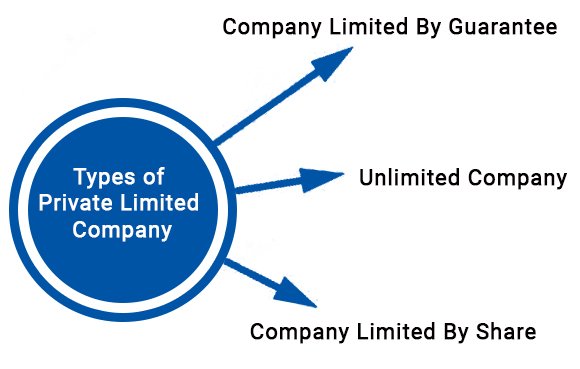

A private company is a non-governmental organization or a small group of shareholders, controlled by The Companies Act, 2013. A private limited company is considered the easiest way to setup legal identification of your business.
The private limited company registration process is not time-consuming, costly, and straightforward, and it is easier to restructure or wind up the business.

According to the company’s act 2013, it allows various companies, as there are three types of private limited companies.
Private Limited Company which is limited by guarantee, the liability of the members is limited to the amount of liability undertaken by each of the members. Limited by guarantee is suitable for clubs, trade associations, societies, and entities requiring very minimal capital.
Unlimited Companies are those types of companies that do not have any limit on the liability of their members as in this, the liability of each member extends to the amount of the company’s loss and liabilities. In this type of private limited company, the members cannot be sued individually.
A company limited by shares, the liability of the members is limited by the form signed by the members to the nominal amount of their share or so much which remains unpaid. Limited by shares is restricted to the pay share capital that remains unpaid.
Private Limited Company Registration In India
For registration of the company, the entire process is here to avail for a private limited company in India.
A digital signature is a must to fill the company’s formations form. The registration process for Private Limited Company (PLC) is online, and a digital signature is mandatory.
The second step is Director Identification Number, as it is a unique number applied and allotted once in a lifetime.
To get name approval, one has to make an application for the name of the reserved company. The application is to be made, where one can apply for a maximum of 2 names of the company for preference. One should remember that the names applied are not identical with any existing Company or LLP, or Registered Trademark.
Once the name is approved, it is reserved for the individual for 20 days. In these 20 days, one should start with the other process for the Incorporation of the Company, non-compliance that leads to withdrawal of the name approved by the Ministry.
The next step is reserved for the proposed company. One should proceed with requesting a Certificate of Incorporation in SPICe form. The application should be submitted by paying the stamp duty. Once the application form is submitted, the form for PAN and TAN is submitted online.
MOA and AOA
MOA and AOA refer to the Memorandum of Association and Articles of Association. These two are considered the most critical document for registration for any company. For registering as a private limited company, this article should consist of 3 clauses in addition to general clauses.
Is the time taken to register a company?
The whole process, along with the approval of DIN, Name, and Incorporation, takes seven working days.

Advantages of Private Limited Company In India ?
Shareholders of a private limited company have very little liability. As a shareholder, one should only pay for the company’s liability only for the contribution you made for the company.
Private Limited Company (PLC) has a separate legal entity, which means the firm is responsible for its assets and liability. Hence an individual is not responsible for any of the losses. So, no one can go against you to recover the money.
A private limited company comes with compliance requirements; hence it is preferred by many entrepreneurs as this helps to raise funds.
The private limited company holds “perpetual succession” that is continuous until it is completely dissolved. As the company is a separate legal person, it is not affected by the death of any member.